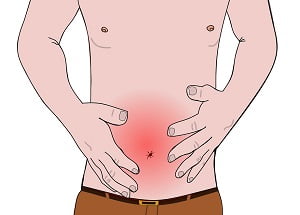Did you know that diarrhea is the second leading cause of death in children under 5 years old? It’s a serious health issue, and one that requires treatment. In this blog post, we’ll discuss eight common causes of diarrhea and how to treat it. Stay safe and healthy!
What Is Diarrhea?
Diarrhea is a condition characterized by frequent, loose stools. It can be caused by a variety of things, including infections, food poisoning, allergies, and certain medications. Diarrhea can also be a symptom of other underlying medical conditions. In most cases, diarrhea is not serious and will go away on its own within a few days.
However, it can occasionally lead to dehydration, which can be dangerous. Symptoms of dehydration include thirst, dark urine, fatigue, and dizziness. If you experience any of these symptoms, it is important to see a doctor right away. In the meantime, there are several things you can do at home to help ease your symptoms and speed up your recovery.
These include drinking plenty of fluids (preferably clear liquids like water or broth), avoiding dairy and fatty foods, and taking over-the-counter medications like loperamide (Imodium) to slow down your bowel movements.
Symptoms of Diarrhea
Diarrhea is a condition that is characterized by loose, watery stools.
- Diarrhea can also be a symptom of other underlying medical conditions. In most cases, diarrhea is not serious and will resolve on its own.
- It can be caused by a number of different things, including viral or bacterial infections, food intolerances, and medications.
- Common symptoms of food intolerance include abdominal pain, bloating, and diarrhea.
- However, it can sometimes lead to dehydration, which can be very dangerous.
- Symptoms of diarrhea include frequent, watery stools, abdominal cramps, and bloating.
- If you experience any of these symptoms, it is important to stay hydrated by drinking plenty of fluids.
- You should also avoid milk and dairy products, as they can worsen the condition.
- If your symptoms persist for more than a few days, or if you develop a fever or blood in your stool, you should see a doctor as soon as possible. You can consult the best Gastroenterologist for better advice and its cure.
Causes of Diarrhea
1. Stomach Flu
Diarrhea is usually caused by a virus that affects the gut. This can be called “intestinal flu” or “stomach flu.” The virus causes the stomach and intestines to become inflamed and filled with fluid. This can lead to watery stools and abdominal cramps.
The most common cause of diarrhea is contaminated food or water. However, it may also be caused by certain medications, such as antibiotics, or by disorders of the digestive system. In most cases, diarrhea will resolve itself within a few days. However, severe cases may require medical treatment.
If you experience more than three loose stools in a day, consult your doctor. Diarrhea can also lead to dehydration, so it is important to drink plenty of fluids if you are affected.
2. Viral infections of gastrointestinal tract
Diarrhea is usually caused by a virus that attacks the gastrointestinal tract. However, there are other potential causes of diarrhea, including bacteria, parasites, and food intolerance.
Bacterial infections are often the result of contaminated food or water. Parasitic infections can be contracted from contaminated food or contact with an infected person. Food intolerance occurs when the body cannot properly digest a specific food.
In some cases, diarrhea may also be a symptom of a more serious condition, such as Crohn’s disease or ulcerative colitis. If you experience chronic diarrhea, it is important to see a doctor so that the cause can be properly diagnosed and treated.
3. Alcohol abuse
Alcohol abuse is a serious problem that can lead to a number of health problems, including liver damage, pancreatitis, and gastrointestinal problems. One of the most common gastrointestinal problems associated with alcohol abuse is diarrhea.
Diarrhea is defined as the frequent passage of loose, watery stools. It can be accompanied by cramping, abdominal pain, bloating, and gas. Alcohol abuse can cause diarrhea by damaging the lining of the intestines and causing inflammation.
In addition, alcohol inhibits the production of vasopressin, a hormone that helps to regulate fluid balance in the body. As a result, people who abuse alcohol are at risk of dehydration, which can also contribute to diarrhea.
4. Allergies to certain foods
Many people experience occasional bouts of diarrhea, and while the cause is often not serious, there are some cases where diarrhea can be a sign of a more serious condition. One potential cause of chronic diarrhea is an allergy to certain foods.
Common allergens include dairy products, gluten, soy, and peanuts. People with food allergies may experience symptoms such as abdominal pain, bloating, and diarrhea after eating even a small amount of the offending food.
In some cases, the only way to control the symptoms is to avoid the allergen entirely. If you suspect that you may have a food allergy, it is important to see a doctor for testing and treatment.
5. Diabetes
Diarrhea is a common symptom of many different conditions, including diabetes. While diarrhea can be caused by several factors, such as stress or a change in diet, for people with diabetes, it is often the result of high blood sugar levels.
When blood sugar levels are too high, the body tries to rid itself of the excess sugar by flushing it out through the intestines. This can cause watery stools and abdominal cramping.
People with diabetes should monitor their blood sugar levels closely to help avoid episodes of diarrhea. If they do experience diarrhea, they should stay hydrated and contact their doctor if the symptoms persist.
6. Diseases of the intestines
Although it can be caused by a number of different factors, diseases of the intestines are one of the most common causes. Crohn’s disease and ulcerative colitis are two examples of intestinal disorders that can lead to diarrhea.
Crohn’s disease is a chronic inflammatory condition that can affect any part of the digestive system, while ulcerative colitis is an inflammatory bowel disease that primarily affects the large intestine.
Both conditions can cause severe abdominal pain, cramping, and diarrhea. In some cases, the diarrhea may be bloody. If you experience any of these symptoms, it is important to see a doctor for diagnosis and treatment.
7. Eating foods that upset the digestive system
Three or more loose or watery stools per day are considered to be a case of diarrhea. It is a common condition that usually clears up on its own within a few days. However, diarrhea can also be a symptom of a more serious underlying condition.
There are many potential causes of diarrhea, but one of the most common is eating foods that upset the digestive system. This can include spicy foods, fatty foods, and dairy products.
In addition, certain medications can also cause diarrhea as a side effect. While most cases of diarrhea are not serious, it is important to see a doctor if you experience severe symptoms or if the diarrhea lasts for more than a week.
With proper treatment, most people can quickly recover from this uncomfortable condition.
8. Infection by Bacteria
There are many different causes of diarrhea, but one of the most common is an infection by bacteria. When these bacteria enter the intestines, they release toxins that can cause the cells lining the intestine to become inflamed and produce large amounts of watery stool.
In some cases, the bacteria may also cause the intestine to secrete more water than usual. In addition, certain types of bacteria can cause the body to produce too much bile, which can also lead to diarrhea. Although most bacterial infections will clear up on their own, some may require treatment with antibiotics.
Severe or persistent cases of bacterial diarrhea can also lead to dehydration, so it is important to seek medical attention if you experience any severe symptoms.
Diarrhea Diagnosis
Diarrhea is a common condition that can be caused by a variety of factors, from infection to food intolerance.
- While it is usually not serious, persistent or severe diarrhea can lead to dehydration, so it is important to be able to recognize the symptoms and seek medical help if necessary.
- Diarrhea is characterized by loose, watery stools and often occurs accompanied by abdominal pain, cramping, bloating, nausea and fatigue.
- If you experience these symptoms, it is important to stay hydrated by drinking clear fluids like water or broth.
- You should also avoid dairy products, caffeine, alcohol and sugary drinks, as these can worsen the symptoms. The majority of the time, diarrhea will go away on its own in a few days.
- If you have severe symptoms or if the diarrhea lasts for more than a week, you should see a doctor for a diagnosis at Marham- Find a doctor.
Treatment for Diarrhea
Diarrhea is usually not a serious condition, it can lead to dehydration if left untreated. As such, it is important to seek medical treatment if you experience severe or persistent diarrhea.
Antibiotics or Medicines
When it comes to treating diarrhea, doctors typically prescribe antibiotics or medicines that target parasites if the cause is bacterial or parasitic infections. As always, it’s important to talk to your doctor before using any complementary or alternative medicines or practices, including probiotics.
This is for safety reasons. Beyond that, depending on the cause of your diarrhea, your doctor will likely have specific recommendations for treatment. So if you’re struggling with chronic diarrhea, be sure to reach out to a medical professional so you can get started on a path to relief.
Probiotics
If the diarrhea is chronic, however, and caused by conditions such as Crohn’s disease, irritable bowel syndrome, or ulcerative colitis, different treatments may be recommended by doctors. For example, they may suggest probiotics.
Probiotics are live microorganisms (usually bacteria) that resemble the microorganisms naturally found in your digestive system. Even though researchers are still studying the use of probiotics to treat diarrhea, some people find them effective.
Drinking plenty of fluids
Treatment for diarrhea typically includes drinking plenty of fluids and eating foods that are easy to digest. In some cases, your doctor may also prescribe medication to help relieve your symptoms.
In most cases, diarrhea will resolve on its own within a few days. However, if you experience severe or bloody diarrhea, or if your symptoms last longer than a week, it is important to see your doctor as soon as possible.
By following the recommended treatment plan, most people are able to recover from diarrhea within a few days.
When to see a Doctor?
Though most cases of diarrhea will resolve on their own within a few days, there are some situations where it is necessary to call your doctor.
- If you have blood in your diarrhea or black, tarry stools, this could be a sign of a more serious underlying condition and you should seek medical attention.
- A fever that is high (above 101 F) or that lasts more than 24 hours can also be a cause for concern, as can diarrhea lasting longer than 2 days.
- Nausea or throwing up that prevents you from drinking liquids to replace lost fluids can lead to dehydration, so it is important to call your doctor if you are experiencing this symptom.
- Severe pain in your belly (especially the right lower quadrant) or rear end can also indicate a more serious problem, and you should seek medical attention if you are experiencing this kind of pain.
- Finally, if you have recently traveled to a foreign country and are now experiencing diarrhea, it is important to call your doctor as this could be a sign of traveler’s diarrhea, which can be more serious.
By being aware of these symptoms, you can ensure that you get the treatment you need in a timely manner.
Ending Notes
Diarrhea is a common problem that can have many different causes. Fortunately, there are treatments available for most cases. If you are experiencing diarrhea, be sure to see your doctor to determine the cause and get treatment.
At Marham, we want to help you feel your best. We offer online diagnosis and treatment for a variety of health problems, including diarrhea.
Our team of experts is ready to help you get relief from your symptoms and get back to feeling like yourself again. So, talk to an expert right now.






